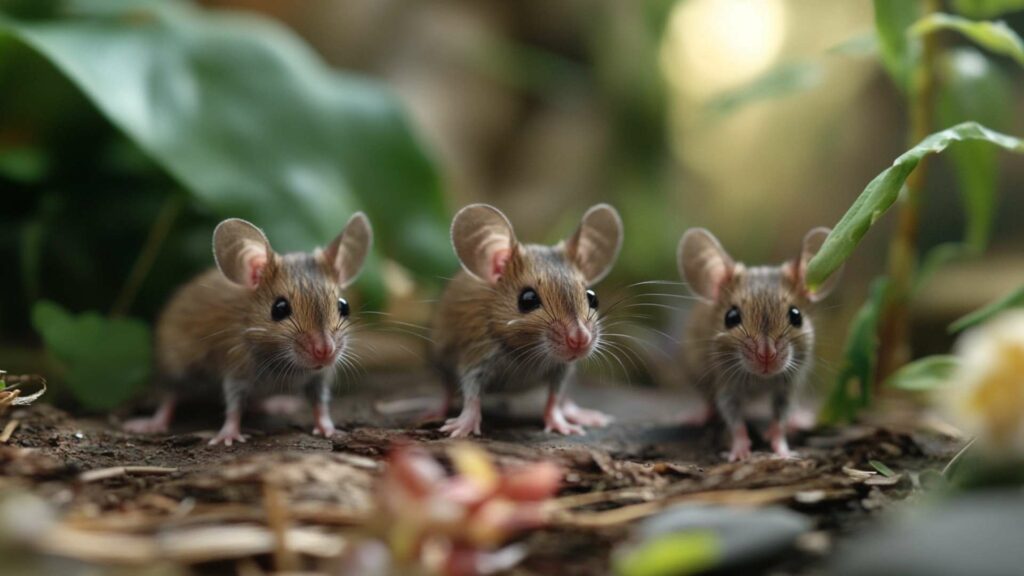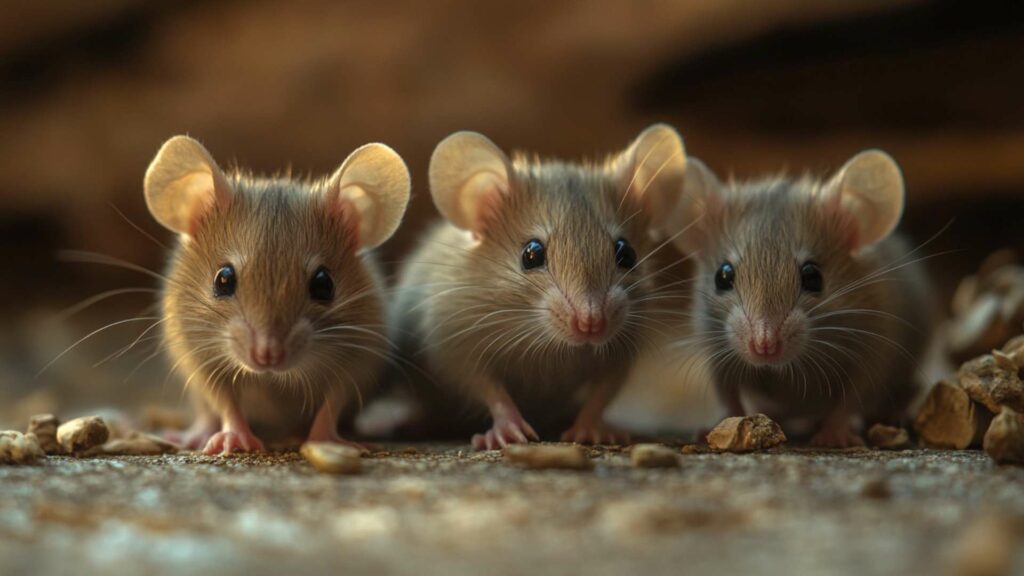Mice infestations are a common problem in many households. These tiny creatures may look cute, but they can cause significant damage to your property and pose a threat to your health. This article will discuss why mice prevention and control are crucial for your home.
Importance of Mice Prevention and Control

Mice carry diseases that can be transmitted to humans, making them a significant health risk. Some of the diseases that mice carry include salmonella, hantavirus pulmonary syndrome (HPS), and lymphocytic choriomeningitis (LCMV).
If you have a mouse infestation in your home, you might be at risk of contracting any of these illnesses. Furthermore, mice can damage your property in several ways.
They gnaw on wood, wires, and insulation materials – which can cause electrical fires or damage the structure of your house. Additionally, their droppings can contaminate surfaces and food items – making them unsanitary for human consumption.
Professional Rodent Control at Your Service. Trust our team of specialists to handle your mouse infestation effectively. Find out more about our comprehensive rodent control and removal solutions and take the first step towards a mouse-free environment!
Brief Overview of the Topic
In this article, we will cover various aspects related to mice prevention and control. We will discuss how mice enter homes and what attracts them to household environments. We will also provide tips on how you can prevent mice from entering your house by sealing potential entry points or maintaining cleanliness.
Additionally, we will provide practical information about the signs of a mouse infestation so that you know when it’s time to take action. We’ll offer tips on trapping or removing dead rodents and share some natural remedies that could help keep mice away from your home.
Whether you’re dealing with common house mice or deer mouse infestations or want information on tamper-resistant mouse bait stations or multiple capture live traps – this article has got you covered. By following our guidelines, you can get rid of mice and keep them from coming back.
Understanding Mice Behavior
What Attracts Mice to Your Home?
Mice are attracted to homes where they can easily find food, water, and shelter. They are also attracted to warm environments, making your home the perfect place for them to nest. The most common types of mice that invade homes are the house mouse, deer mouse, and white-footed mouse.
These rodents have a keen sense of smell and can easily detect food sources from a distance. To prevent mice from being attracted to your home, it is important to keep your living space clean and free of crumbs or spilled food that may attract these pests.
Also, be sure to store all of your food in containers that are airtight and properly sealed. This will prevent mice from smelling food and entering your cupboards or pantry.
How Do Mice Enter Your Home?

Mice can enter your home through small cracks or holes in the walls or floors. They can squeeze through openings as small as a dime! Once inside, they typically build their nests in walls, attics, basements or crawl spaces.
To prevent mice from entering your home, it is important to seal all potential entry points around the perimeter of your home using caulking materials or steel wool. Pay attention to areas around pipes or utility lines where gaps may exist.
Mice Breeding Habits and Lifespan

Mice breed quickly; one female house mouse can produce up to 35 babies per year! The gestation period for female mice is only 19-21 days which means they can reproduce rapidly within a short amount of time. House mice typically live for about 18 months but have been known to survive for up to two years if they have access to good shelter and abundant food sources.
Understanding how mice behave is crucial when it comes to preventing and controlling their presence in your home. By being aware of what attracts mice to your home, how they enter it, and their breeding habits, you can take the necessary precautions to prevent a rodent infestation.
Signs of Mice Infestation
Visual Signs: Droppings, Gnaw Marks, etc.
One of the most common signs of a mouse infestation is droppings. Mouse droppings are small, pellet-like and can be found scattered around the house. The number of droppings can give you an idea about the severity of the infestation.
If you find fresh-looking droppings, it means that there is mouse activity in your home. Another sign to look for is gnaw marks or chewed items.
Mice have teeth that constantly grow, so they need to gnaw on things to keep them trimmed down. This means that they will often chew on anything they can find, including electrical wiring and other materials which can lead to serious problems.
If you suspect a mouse problem in your home, thoroughly examine all areas where mice may hide or nest such as cabinets and pantries. Look for any holes or openings through which mice could enter your home, especially around pipes and utility lines.
Auditory Signs: Squeaking and Scratching
Mice are active at night and will make noises as they move around inside walls or ceilings looking for food and water. If you hear scratching noises coming from walls or ceilings, it could be a sign of a mouse infestation.
Squeaking sounds may also indicate that there are baby mice (pinkies) present in your home since they make more noise than adult mice.! If you hear any strange sounds coming from within your walls, don’t ignore them as this could lead to larger problems down the road like rat or rodent infestations, or food poisoning issues.
Smell and Odor Signs
A strong urine smell is often associated with mice infestations. This smell comes from urine puddles left by the rodents after frequenting certain areas of your home.
In cases where there is a large enough mouse population problem or dead rodents present, the smell can be extremely strong and unpleasant. Another smell which can indicate a mouse infestation is a musty odor caused by their nesting materials.
Mice nests are typically constructed out of soft materials like shredded paper, fabric or insulation. Check for any signs of mouse nests especially around food supply areas.
Recognizing mouse infestations droppings, sound and electronic devices, and odors are important in identifying if there is a mouse problem in your home. Catching the problem early can save you from bigger headaches down the road like tamper resistant bait traps and boxes or having to deal with the aftermath of dead rodent removal.
Prevention Methods
Sealing Entry Points: Keeping Mice Out
How to Safeguard Your Home: Preventing Mice from Entering
When it comes to protecting your home from mice, taking proactive measures can make a significant difference. By following these preventive steps, you can effectively keep mice from entering your house and avoid the hassle of dealing with an infestation.
A crucial aspect of mouse prevention is sealing off all potential entry points. Mice can infiltrate through small openings, so it’s essential to thoroughly inspect your home. Common entry points include gaps around doors, windows, vents, and utility pipes. To learn more about these entry points and effective sealing techniques, check out our comprehensive guide on common entry points for mice and how to seal them.
Maintaining cleanliness and eliminating attractants are also vital in mouse-proofing your house. Mice are drawn to accessible food sources, so storing food in airtight containers and promptly cleaning up crumbs and spills can act as deterrents. Proper waste management is equally important, as mice can find shelter and sustenance in garbage bins. For detailed insights into effective methods for keeping mice at bay, refer to our informative article on mouse-proofing your house.
While commercial mouse repellents are available, some individuals prefer natural remedies. Certain scents, like peppermint oil and cloves, are known to repel mice. If you’re interested in exploring natural alternatives and their effectiveness in deterring mice, our article on natural remedies to deter mice offers valuable insights.
If you suspect a mouse infestation in your home, prompt action is crucial. Delaying treatment can lead to further damage and potential health risks. Our article on steps to take if you suspect a mouse infestation provides comprehensive guidance on what to do when you encounter signs of mice in your house.
By being proactive and implementing preventive measures, you can effectively reduce the risk of a mouse infestation in your home. Regularly inspect your property, address potential entry points, and apply the tips and techniques outlined in our articles on mouse prevention and control. Take control of your home’s safety and keep mice at bay.
Proper Food Storage: Starving Them Out

Mice carry diseases, and one way they spread these diseases is by contaminating our food supply. They’ll eat just about anything but prefer grains; so if you have pets, don’t leave their food out overnight!
Store all dry goods like flour and cereal in airtight containers made of glass or metal. If you have outdoor feeders for birds or other wildlife, make sure they are far enough away from your house to prevent mice from taking advantage of the easy meal plan.
And don’t forget about fruit! Mice love juicy snacks like apples and oranges left on countertops; store excess fruit in the refrigerator.
Maintaining Cleanliness: Making Them Want to Leave

Mice seldom venture too far from their nests for food since they know there’s safety in numbers when they’re at home with their families. So while blocking entry points will help prevent new individuals from getting in, it’s important to make sure that the ones already inside can’t find a reason to stick around. Keep your home clean!
Sweep and mop regularly, wipe down counters and tables after use, and keep trash in covered containers. If you have pets, clean up any messes right away.
Not only will these tips help reduce the number of mice in your home, but they’ll also improve overall sanitation. Win-win!
Control Methods
Traps: Types and Effectiveness

When it comes to trapping mice, there are two main types of mice traps available: snap traps and glue traps. Snap traps are the more traditional type of mouse trap and work by quickly killing the mouse when triggered. Glue traps, on the other hand, use a sticky substance to trap mice in place until they die or can be released elsewhere.
Snap traps are generally considered more effective than glue traps at actually catching and doing house mouse prevention without killing mice. They’re also less likely to cause unnecessary suffering for the animal.
However, depending on your personal views on killing animals, you may prefer using glue traps instead. One important factor when using snap or glue traps is placement of fresh bait.
Mice seldom venture out into open areas; they prefer to stick close to walls and other surfaces where they feel safe from predators. Place your trap(s) along walls or near entry points where you’ve seen mouse activity for best results.
Poison Baits: Pros and Cons
Poison or mouse baits can be another effective way to control a mouse infestation in your home. These baits are formulated with ingredients that will harm or kill mice when ingested over time.
One of the main advantages of using poison baits is that they require very little effort on your part – simply place them in areas where you’ve seen mouse activity and wait for them to take effect. However, one major disadvantage is that it can be difficult to avoid dead mouse odors if a poisoned rodent dies somewhere out of sight.
Another thing to keep in mind with poison and rodent baits, is that they can pose a risk not just to mice but also any pets or young children who might come into contact with them accidentally. Always read the label carefully before using any kind of rodent bait and follow all safety precautions recommended by the manufacturer.
Professional Extermination Services

If you’ve tried all of the DIY methods available and still can’t get rid of your rodent infestation, it may be time to call in the professionals. Pest control companies have specialized tools and expertise that allow them to identify entry points and remove mice more quickly than you’d be able to on your own. Some of the most effective methods used by professional exterminators include bait stations, exclusion techniques, and sound or electronic devices that emit high-frequency noises to deter mice from entering your home in the first place.
Of course, hiring a professional can be costly – but it may be worth it if you’re dealing with a persistent rodent infestation that just won’t go away. Consider getting quotes from several companies before making a final decision on who to hire for the job.
Natural Remedies for Mice Control
Vinegar Solution: Natural and Safe Mice Control
Did you know that vinegar can be used to prevent mice from entering your home? Vinegar has a strong odor that repels mice, making it an effective natural method to keep mice out of your home.
To use vinegar as a mouse repellent, mix equal parts water and white vinegar in a spray bottle and apply it around the areas where you have spotted mouse droppings or signs of infestation. Use caution when spraying the vinegar solution as prolonged exposure can cause damage to surfaces.
For best results, apply the solution every few days or until you no longer spot mouse droppings. To avoid exposing pets or children to the solution, make sure to store any leftover mixture in glass or metal containers with tight lids.
Peppermint Oil Spray: Aromatic Mouse Repellent

Peppermint oil is another natural remedy for effective mouse control. The strong aroma of peppermint oil is known to repel mice and other pests. Simply mix 5-10 drops of peppermint oil with 1 cup of water in a spray bottle, shake well and spray around areas where you have noticed signs of rodent activity.
Keep in mind that while peppermint oil is safe for humans and pets, it can be toxic if ingested by deer mice or white-footed mice. If using this method near areas where these types of rodents are known to reside, use caution and monitor the situation closely.
Ultrasonic Repellents: High-Pitched Sounds Drive Mice Away
Ultrasonic repellents are electronic devices that emit high-pitched sounds that humans cannot hear but are unbearable for rodents like house mice. These devices are an effective way to prevent a house mouse control problem before it starts.
Simply plug in an ultrasonic repellent in an area where you have noticed mouse activity, and it will emit high-pitched sounds that will drive the mice away. Ultrasonic repellents are silent, safe for humans and pets, and can cover large areas of your home.
While natural remedies for mice control are generally safe and effective, they may not be able to completely kill rodents or remove a mouse infestation. If you have a severe mouse problem or if natural remedies do not work, consider using bait stations or professional extermination services to effectively kill mice without exposing yourself to dead mouse odors or having to remove dead rodents on your own.
Conclusion
Mice infestations can be a major headache for homeowners. Knowing what attracts mice to your home, understanding their behavior and breeding habits, and recognizing the signs of an infestation are crucial in preventing and controlling an outbreak. Proper prevention methods, such as sealing entry points, food storage, and cleanliness, can go a long way in keeping mice at bay.
Furthermore, several different rodent control methods exist to help rid your home of these pesky critters. In addition to more traditional methods like mouse traps and poison baits, natural remedies like vinegar solutions or peppermint oil sprays can also be effective.
Sound and electronic devices have also become increasingly popular in recent years. However, it’s important to note that while these methods may work in some cases, they’re not guaranteed solutions.
Final Thoughts on the Importance of Mice Prevention and Control
Taking steps to prevent mice from entering your home is ultimately much easier than dealing with an infestation once it’s out of hand. It’s important to keep food stored away properly (especially pet food), avoid leaving cereal grains or other enticing materials out in the open overnight, and regularly check for signs of mice activity.
If you’re already facing a full-blown infestation, professional pest control services may be necessary. And remember: while poison baits can be effective in controlling mice populations quickly, tamper-resistant bait stations with properly formulated baits are crucial for ensuring that children or pets don’t accidentally ingest the poison.
Overall, staying vigilant when it comes to preventing mice from entering your home is key. With proper placement of traps or sound devices (if you choose to use them), regularly checking for mouse droppings or other signs of activity around the house will ensure that any potential issues are caught early on – avoiding dead mouse odors from trapped rodents, or the need for more expensive pest control services.
Frequently Asked Questions:
The best way to prevent mice is by sealing entry points, keeping a clean environment, and removing potential food sources.
Achieving permanent elimination of mice involves a combination of trapping, sealing entry points, maintaining cleanliness, and addressing any underlying issues.
Mice dislike scents like peppermint, cloves, or ammonia.
Sudden presence of mice in your house could be due to factors such as changes in weather, availability of food sources, or nearby construction disrupting their habitat.
If you found this article to your taste, you might also find value in these related writings:
Uncovering the Secrets of Mice: Exploring Behavior and Characteristics
Mouse Menace: Safeguarding Your Pets from the Silent Threats








